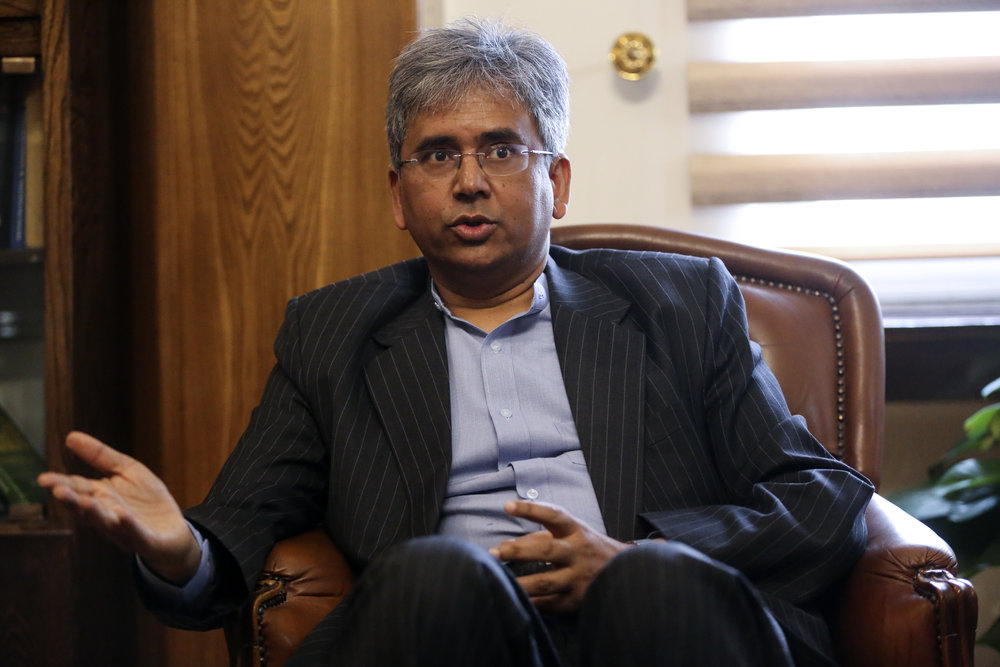India, Iran have potential to strengthen ties in the current situation: ambassador

TEHRAN – New Delhi’s top diplomat to Tehran is of the opinion that under the current circumstances that the Islamic Republic has come under sanctions by Trump’s White House, India and Iran can use their capacities in a positive way to strengthen ties.
“We have, I think, good potential to strengthen bilateral cooperation in different areas,” Saurabh Kumar tells the Tehran Times in an exclusive interview.
Following is the text of the interview:
Q. What stance has India taken on the re-imposed U.S. sanctions on Iran?
A. External Affairs Minister of India had during her annual press conference in May stated very categorically India’s consistent political position that we do not recognize unilateral sanctions. Foreign Minister Zarif had visited India in May, and this press conference, in fact,
“My expectation is that the circumstances under which we are could be utilized in a positive manner.” happened to take place when Dr. Zarif was there. So, this is as far as our political position is concerned.
As far as Iran’s nuclear program is concerned, we again have a principled and long-standing position, which is to recognize Iran’s right to nuclear energy, as well as, the interest of the international community to see that Iran’s nuclear program is entirely for peaceful purpose. India is not a party to the Joint Comprehensive Plan of Action [JCPOA]. We have seen the developments which have taken place regarding the JCPOA, and it is our hope and desire that these issues would be resolved in a constructive manner.
Q. What strategy has India designed to continue economic relations with Iran after the imposition of the second round of brutal sanctions on Iran which went into effect on November 5?
A. The two countries have a historical relationship. We have been working to expand our economic and trade ties. When Iran was subjected to sanctions last time, we continued our cooperation to the extent we could. We are heading into a difficult phase again, but we have been talking, and have revived the Rupee mechanism, which in fact, was put in place last time. It has been made more robust. Our expectation is that it would be utilized to continue our bilateral relations in the area of trade and economy.
“As far as Chabahar port is concerned, India's engagement is known. There is a component of investment, a credit line, the body of contracts – main contract and contract for interim operations, both of which have been signed. We are having some banking difficulties, and it remains to be seen that with the provisions that have been announced, how things related to banking, shipping, and other relevant issues will ease so that we can move ahead.” Q. What is India’s latest plan on importing oil from Iran? What percentage of Iran’s oil will be going to Indian companies after November 5?
A. I can tell you about the last two months’ figures that I am aware of; for the months of October and November, India placed orders for around 1.25 million metric tons each. This works to roughly 300,000 barrels per day. There are some Indian companies, particularly in
the private sector, which have exposure to the American financial system, and have stopped buying Iranian crude; that is to be expected. The U.S. has also announced exemptions to eight jurisdictions/countries and India is one of them. We expect to continue buying Iranian crude around the above figure.
Q. Except for oil and gas, what other parts of the economic spectrum can Iran and India share in their bilateral relations?
A. As I said, we have a bilateral Rupee mechanism which can be utilized for trade. We can do more than bilateral trade. I think the challenge is for both countries to start doing more and utilize the mechanism. We have, I think, good potential to strengthen bilateral cooperation in different areas. My expectation is that the circumstances under which we are could be utilized in a positive manner.
Q. What is India’s newest development plans in Chabahar port? How can India use the capacity of the port to improve trade and economic relations with Iran and regional countries?
A. We have been working closely with Iran on Chabahar-related matters. Last month we had an important meeting between India, Iran, and Afghanistan at the deputy minister level to start moving towards operationalizing the trilateral transit agreement or the Chabahar agreement. This was an important development. The Iranian side has proposed the dates for the meeting of the follow up a group which will go into details and technicalities of transit and transport-related matters. The Americans have provided an exemption under the Iran Freedom and Counter-Proliferation Act as far as Chabhar port is concerned. We still need to know details of this exemption, but we look to it as a positive development.
As far as the port itself is concerned, India's engagement is known. There is a component of investment, a credit line, the body of contracts – main contract and contract for interim operations, both of which have been signed. We are having some banking difficulties, and it remains to be seen that with the provisions that have been announced, how things related to banking, shipping, and other relevant issues will ease so that we can move ahead.
So, overall, the cooperation has been good, and we look forward to moving ahead.
